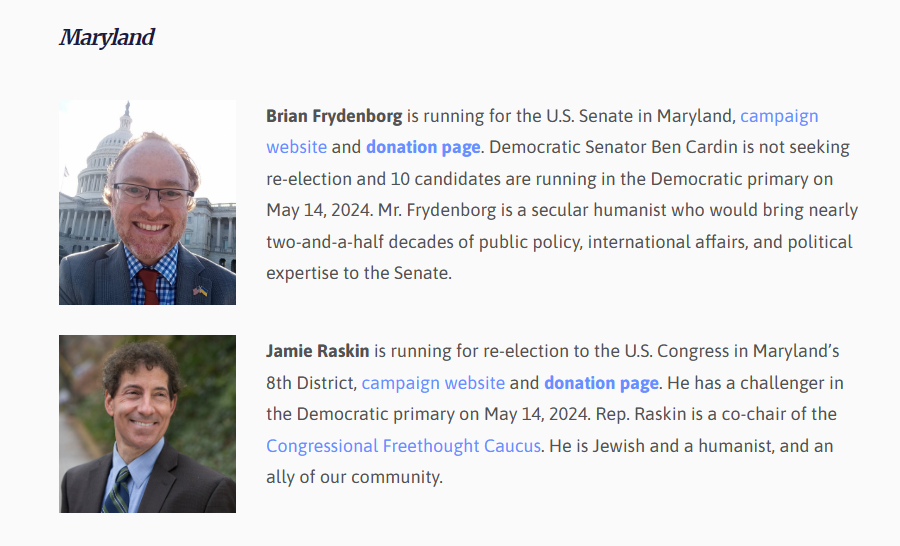Yes, I am using my own news website to promote my candidacy and ideas I am putting forth as a candidate for U.S. Senate for Maryland and I won’t apologize for it!
By Brian E. Frydenborg (Twitter @bfry1981, Threads @bfchugginalong, LinkedIn, Facebook, Substack with exclusive informal content) April 15, 2024; see all of Brian’s Maryland U.S. Senate race coverage here; because of YOU, Real Context News surpassed one million content views on January 1, 2023, but I still need your help, please keep sharing my work and consider also donating! Real Context News produces commissioned content for clients upon request at its discretion.

SILVER SPRING—Though I earlier expressed my pride and gratitude about being one of only two candidates in races in Maryland endorsed by the national humanist and atheist organization the Center for Freethought Equality (alongside the singular all-star Jamie Raskin), I have for some time been wanting to elaborate on why this is such an honor and why this means so much to me.
While I did experience a few years as a person of religious faith as a teenager and young man, within a few years of graduating college, I fully realized I was no longer a person of any sort of religious faith or conviction. For me, I felt a spiritual connection with my fellow humans and creation, not in any sort of divine being or beings, and not according to any religious texts of the major faiths and sects of the world, no matter how ancient they may be, no matter how revered by some.
According to Pew, 28% of Americans in 2023 considered themselves part of the largest and most rapidly growing religious demographic category in the country: the religiously unaffiliated, with 17% of those identifying as atheist—about 4.8% of all Americans—and 20% as agnostic—5.6% of all Americans. That means well over 10% of all Americans are atheist or agnostic along with me (I consider myself a non-theist Secular Humanist, not quite a full atheist—I don’t claim to know as a fact that no god or gods exist—but certainly far more strident than an “I don’t know” agnostic).
And yet, there are very few members of Congress who are atheist, agnostic, or more generally unaffiliated, each group grossly underrepresented relative to their proportion of the overall population in the U.S. Congress and other elected offices. While hardly facing the challenges of, say, African-Americans or the LBGTQ+ population, we are, therefore, still an underrepresented minority that does deserve more representation in government. I remember personally attending President Barack Obama’s First Inaugural Address on the National Mall in Washington, DC, back in January 2009, when he said in the middle of his speech: “We are a nation of Christians and Muslims, Jews and Hindus, and non-believers.” That was the very first time I remember any senior member of my own government speaking to me in that capacity, acknowledging that people who thought like me in that sense even existed; it meant a lot to me then and still does today. So I am proud to be running as a Secular Humanist and I wanted to share some thoughts about what this label means to me.
There is a myth about those of us not professing a religious faith: that we are mostly or even all nihilists or believe morality and ethics do not exist. People who think this about us tend to think that without “God,” everything must be permitted. But for many of us, this could not be further from the truth. To start with, every major faith more or less teaches the same basic morality: murder, rape, theft are not generally encouraged, politeness and honesty are, etc., etc. There is not a great difference from one to the other on anything truly moral or ethical, rather, they try to conflate the particulars of religious practice—how deities or a deity is called or acknowledged and when, or even personal dietary or sexual practices—with ethics and morality, but the larger moral and ethical teachings emphasized today are actually quite unoriginal and vary little.
Indeed, the idea that morality—the distinctions between right and wrong, good and evil—exists independent of gods and religion famously dates as far back as Socrates’ Euthyphro dialogue (at least as constructed by Plato, centuries before the existence of either Christianity or Islam): that something is good not because the gods deem it so, but because it is good and the gods love it because it is good if the gods are to be considered moral authorities at all.
Thus the late and great Christopher Hitchens makes the compelling and, indeed, objectively irrefutable point: you cannot find a single moral act performed or statement uttered by a religious person that cannot also be performed by a nontheist non-believer (and he argued you can, in fact, find the opposite) and writes that “Human decency is not derived from religion. It precedes it.”
It not only precedes it in the era of Plato, but into prehistory and far beyond, as we can even observe rudimentary societal morality in groups of chimpanzees, wolves, and other pack animals: decency predates not only religion, but predates humankind going back to our pre-human ancestors.
So for me, when we take this broader view, it is hard to taker seriously the claims of some religious folks that “religion” or “God” is the exclusive source of morality. We can each take morality from our own sources so long as we treat each other with a spirit of equality, respect, and freedom of choice.
But far too often in history, religion and its enforcers have allowed anything but and try to impose their views on everyone else through the use of force. This occurs even today, sadly, but even in democracies like the U.S. we have seen non-violent attempts with the anti-reproductive (“pro-life”) movement, its members trying to impose their views to limit choice through the more undemocratic mechanisms of America’s constitutional republic: the wildly unrepresentative institutions of a 6-3 conservative Supreme Court and the U.S. Senate.
As someone who knows history dating back not only to the recent era but ancient history, I am too informed to only see religion as its modern practice when it has in many places been defanged and removed from government increasingly so after the Enlightenment, with the secular U.S. Constitution being one of the most emblematic and consequential lasting documents of the Enlightenment, which sought to take the power of the state and its coercive, violence force away from the religious authorities and religiously-minded.
As profoundly and accurately articulated by Hitchens:
Many religions now come before us with ingratiating smirks and outspread hands, like an unctuous merchant in a bazaar. They offer consolation and solidarity and uplift, competing as they do in a marketplace. But we have a right to remember how barbarically they behaved when they were strong and were making an offer that people could not refuse.
I would also like to note that those of us who are not theists do not hold out the possibility of divine redemption, absolution, or forgiveness, nor do we fear any punishment by the divine or expect any rewards from the divine, expect no heaven nor hell, in response to our actions here on earth; no, when we do something, the only reward is what comes here on earth from doing the right thing (if any; often we may suffer from doing the right thing), the only forgiveness we can seek comes directly from those whom we have wronged. We must take our good deeds and bad to our grave with no further resolution, reward, or punishment other than their consequences that may or may not outlive us. If anything, then, this means our actions carry even more moral weight for us nontheists: the only absolution or appreciation comes from our fellow humans, with no assistance from anything divine, celestial, or otherwise supernatural. There is a permanence to our actions in our view that no divine intervention can rectify or mollify: there is only one life to live and no forgiveness after death, let alone communication to those we left behind.
In the here and now, though, I applaud any person of religious faith who can find the good and moral in their religion and join hands with me and others like me in seeking to prioritize improving the plight of human beings here on earth and making the world a better place, and there can and should be much on which we can agree and much on which—from abortion to religious practice—we can leave to the conscience of the individual. Thus, as a Humanist candidate who puts his fellow humans first and foremost, I declare I am willing to work with anyone of any faith to advance our common human interests. And it is that spirit of cooperation that embodies the mission of the Center for Freethought Equality: cooperation between and beyond faiths to advance progress for all humankind, and I am, again, very proud to have earned the Center’s endorsement.
Whether you are religious in any way of any faith or are non-religious like me, you can support my campaign here and my journalistic efforts here.

See related articles Frydenborg Holds His Own Against Alsobrooks in Baltimore Maryland U.S. Senate Democratic Primary Debate, but Will It Matter & Why Won’t Local Media Cover this Race Properly?, Maryland U.S. Democratic Primary Debate Raises Questions on Frontrunners’ & Party’s Readiness to Take on Hogan. Can Frydenborg Emerge As Third Option? and Petty Feuding Between Trone and Alsobrooks Does Not Honor Ben Cardin’s Legacy. Vote for Me Instead! And see all of Brian’s Maryland U.S. Senate race coverage here as well as Brian’s official campaign website.
© 2024 Brian E. Frydenborg all rights reserved, permission required for republication, attributed quotations welcome
Also see Brian’s eBook, A Song of Gas and Politics: How Ukraine Is at the Center of Trump-Russia, or, Ukrainegate: A “New” Phase in the Trump-Russia Saga Made from Recycled Materials, available for Amazon Kindle and Barnes & Noble Nook (preview here).

If you appreciate Brian’s unique content, you can support him and his work by donating here; because of YOU, Real Context News surpassed one million content views on January 1, 2023. Real Context News produces commissioned content for clients upon request at its discretion.
Feel free to share and repost this article on LinkedIn, Facebook, Threads, and Twitter. If you think your site or another would be a good place for this or would like to have Brian generate content for you, your site, or your organization, please do not hesitate to reach out to him!